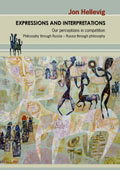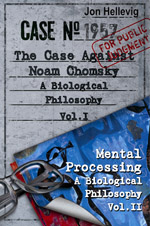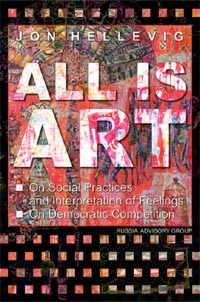|
|
| |
Logic
Logic is branded as a science, where the idea is that words are not only thought to be physical objects (some animated as we have seen), but that they also behave like physical things. - I refute formal logic on the insight that as all we deal with are interpretations of feelings, then certainly one future feeling can in no way be in any correlation in a set pattern to another future feeling � every feeling is unique and will never occur again. There is no logical pattern between one and another expression and there cannot be. Expressions relate to other expressions through interpretations and yet more expressions and they are always new, unique, and without any form of existence. I claim that this form of superstition is best compared to alchemy, and therefore I find it very suitable to call it linguistic alchemy.
The variables in logical formulae are the symbols for our expressions and interpretations. But so are common words; but not only words are symbols, but whole propositions, the whole depiction of a situation, the whole narrative is a symbol � and we have the moral mode of relating, which cannot even be captured by the symbols (sometimes we put a cursive or other effects to try to penetrate there).They are symbols in the meaning that they �stand in instead of something else� � they stand instead of our thoughts, i.e. they stand instead of our feelings � but what we mean is that we wish them to stand instead of them, but we fail. � They have the meaning only in an ever changing context � and that context can never be captured in a special formula � life is the formula.
Stern tells that Wittgenstein earlier held the view that �A proposition is laid against reality like a measuring rod�, and that he changed this view to the idea that �that a system of propositions is laid against reality like a measuring rod�. � The earlier view is the one that comes from formal logic, and reminds me of the anecdotes of the Bembolians (villagers depicted in Swedish folklore in Finland, who are given the role of representing a lot of common foolishness, kind of a whole village of village fools). In one of the stories the Bembolians go fishing, they throw the net in the sea, and in order to find the net in the morning they have to mark the place where the net was dropped. And the Bembolians make a carving on the boat�s edge on the spot to mark the exact place where the fishing net was left. Then they rowed on with the sign corresponding to the meaning firmly in their boat, and the net, the meaning, was lost in the sea of life. This is the same what happens when we encode meaning in concepts; we carry the concepts with us, but lost sight of their place in life. - �The stream of life, or the stream of the world, flows on and our propositions are so to speak verified only at instants. Our propositions are only verified by present� (Wittgenstein in Philosophical Remarks).
Instead of �formal (symbolic) logic� there is a real-life logic. This is the assessment whether we in the usage of language connect words in a fashion that corresponds with the ordinary usage of language (the �grammar� of language) and what the common experience would allow (empirical or practical) logic. Claiming something to be or not to be �logical� or �illogical� is actually stating something of the interrelation between propositions. - Logic is therefore what confirms with life experience (and that is of course totally dependent on how we argue our views on life experience).
Reason
But then what is this �reason�? - It cannot possibly be anything else than the substantive name for the process of reasoning. Reasoning in turn means a conscious weighing of various arguments in order to reach a conclusion. But, if someone speaks of reason in terms of �by reason alone vs. by experience� � then he seems to be claiming that there is a �reason� which sits there somewhere on the shelves of the brain � ready for use (pret-a-porter). Then possibly they mean by reason a process resembling something like looking on the shelves to find the right one, maybe high up in the brain requiring to step on a ladder to reach it or searching all the shelves as if not remembering where the right one was left from previous use. � Maybe �thinking in a specially orderly rational way� as opposed to �just thinking� (or thinking in a lazy way, or being drunken, or just not paying attention, or lacking the capability to think that the logician considers himself
|
|

To download a free pdf file of this book, please click
here
To buy this book, please enter here (www.ruslania.com bookstore)

Click here to download free PDF file

Click here to download free PDF file

Click here to download free PDF file
|

